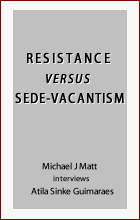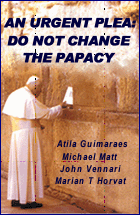Talks with Jan
 |
 |
 |
 |
 |
 |
 |
Francis’ Motu Proprios & the Upcoming Synod
There has been much talk in Catholic circles about a potential split in the Church at the coming October Synod on the family should the official doctrine of the Church be changed on the matter of giving Communion to Catholics divorced in a civil tribunal and remarried also before a civil justice of the peace, who have not received annulments from the Church.
“What do you think?” my friend Jan asked me. “If the next Synod votes yes on Kasper’s proposal, will there be an open rebellion in Church ranks? Have you seen the video with the three Prelates (Card. Leo Burke, Bishop Athanasius Schneider and Archbishop Jan Paul Lenga) who are taking strong stands against any change in Church doctrine on marriage? Are we finally facing a true resistance to the orientation of the Papacy during the disastrous crisis in the Church we have suffered since Vatican Council II?”
Let me address your questions one at a time.
Draining the question of meaning
As everyone knows, one of the main questions on the coming Synod table is the question of divorced and remarried persons being allowed to receive Communion, or the 'Kasper proposal.'
That hot-button question, however, has been drained of any essential meaning after Francis took the initiative of issuing two motu proprios – Mitis Eudex Dominus Iesus (The gentle Judge, the Lord Jesus) and Mitis et misericors Iesus (The meek and merciful Jesus) – presented in Rome on August 8, 2015. The changes will take effect on the same day that starts Francis’ Holy Year of Mercy, December 8, 2015.
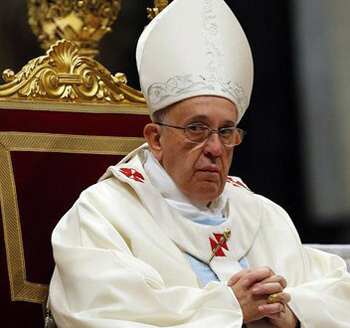 These papal documents provide for Catholics to obtain marriage annulments quicker and easier by reducing the number of courts and judges, dropping automatic appeals and making the process free of any expenses. Reasons for getting an annulment were also amplified. Now, added to the list of “legitimate reasons” for procuring an annulment – which had already been expanded (see here, here and here) – are the following: a lack of faith, brevity of living together, an abortion, having an affair at the time of the wedding or shortly afterwards.
These papal documents provide for Catholics to obtain marriage annulments quicker and easier by reducing the number of courts and judges, dropping automatic appeals and making the process free of any expenses. Reasons for getting an annulment were also amplified. Now, added to the list of “legitimate reasons” for procuring an annulment – which had already been expanded (see here, here and here) – are the following: a lack of faith, brevity of living together, an abortion, having an affair at the time of the wedding or shortly afterwards.
In short, Francis’ legislation makes it even faster, easier and less expensive to obtain an annulment. Basically, anyone can claim an excuse to get a quick and free annulment. These new procedures will allow people to “move on” in their lives, the Pope explained, without the “darkness of doubt” or “weight on their souls” over a previous marriage.
What does this mean for the Synod? Even Time magazine, not known for astuteness on Catholic issues, was quick enough to understand that, by announcing the change before the Synod, the Pope “freed up time for Church leaders to move past the issue of annulments” and “create space” for discussion of other “pressing” Francis matters, like the impact of poverty, war, and forced migration of families. (September 21, 2015, p. 18)
The question of divorced and remarried Catholics receiving Communion likewise becomes a non-issue, since anyone who wants to get an annulment will be able to do so easily. All a person has to do is express the intent to get an annulment, and the parish priest and local Bishops, applying Francis-style “pastoral practice,” will accommodate them to receive Communion.
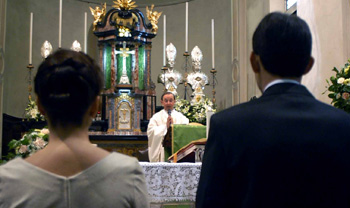 In brief, Pope Francis emptied the discussion of its substance – whether divorced and remarried Catholics should receive Communion – by allowing any of these Catholics to get an easy and fast annulment to “regularize” his situation. Once he has an annulment in the pocket, he can receive Communion like any other Catholic.
In brief, Pope Francis emptied the discussion of its substance – whether divorced and remarried Catholics should receive Communion – by allowing any of these Catholics to get an easy and fast annulment to “regularize” his situation. Once he has an annulment in the pocket, he can receive Communion like any other Catholic.
Msgr. Pio Vito Pinto, head of the commission that drafted the new annulment procedures, was quick to say that the Church’s “sacramental theology of marriage” remains unchanged with the moto proprios.
So, we would have “pastoral change” without doctrinal change, or so it is what Bergoglio wants us to believe. This is a sophism, because in Morals the application of the norms – which is the definition of pastoral – to existing customs is what makes up the doctrine. Nonetheless, this is what the conservatives will have to swallow and digest if they do not have the courage to resist these two motu proprios.
So, the answer to your question on what we should expect from the Synod is this: After these two motu proprios, whatever the Synod decides on this topic will make little to no practical difference.
What about the conservative Bishops who are presenting themselves in full armor ready to enter the battle? Their campaign is over. Francis emptied their fight of its content …
Los tres amigos of the false right
Are the leaders of the reaction authentic?
As for the three champions of orthodoxy on the marriage issue, we can see that they were unseated at the main event of the tournament before the Synod even started.
This trio sprung up in the perfect climate and soil that generates a false right, whose primary purpose is not to destroy the enemy but to contain and control reactions. In the wake of the last Synod and the Kasper proposal, we saw the rise of a vocal and increasingly indignant conservative Catholic public who feared changes in doctrine on the family and marriage. As the tide rose and even started to rage, it became necessary to calm the waters by a show of concern in the leadership of the Church.
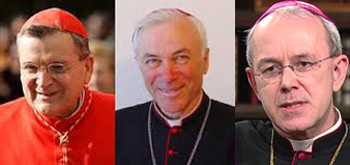 To fill that role, we were given the recently demoted Card. Burke, Auxiliary Bishop Schneider of Kazakhstan (who has already proven his usefulness in pacifying traditionalists while defending the Council – here and here) and retired Bishop Jan Pawel Lenga, also of Kazahkstan.
To fill that role, we were given the recently demoted Card. Burke, Auxiliary Bishop Schneider of Kazakhstan (who has already proven his usefulness in pacifying traditionalists while defending the Council – here and here) and retired Bishop Jan Pawel Lenga, also of Kazahkstan.
From these three Prelates came a stand, not a strong stand, but the minimum necessary to defend Catholic Morals on the question of family and marriage. That is, they affirm there must be no talk of Communion for the divorced and remarried. The “action” that resulted from this stand was a petition begging Francis to clearly affirm teaching on marriage at the Synod on the Family.
We can see what little importance Pope Bergoglio gave to this petition by his issuance of the motu proprios making the annulment process easier and faster…
Rules to discern a false right agent
I am not saying the things these Prelates said are not good, Jan. But, you should realize that they are playing perfectly according to the rules of the false-right.
What are those rules? Here are some norms followed by religious false-right leaders:
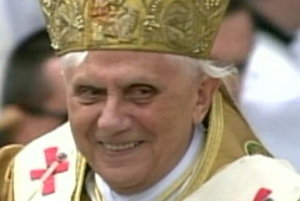
I believe this explanation answers your question: Are we finally facing a true resistance to the disastrous crisis in the Church we have suffered since Vatican Council II?
No, Jan, we are not. Therefore, we should not expect to see a real resistance come on the question of divorced and remarried Catholics receiving Communion at the second session of the Family Synod that convenes next month.
The other topics of the Synod are still open to discussion – welcome to homosexuality, cohabitating couples, contraception etc.
We have seen Francis make initiatives in each of these realms favoring the most progressivist positions. The Bishops certainly can create obstacles to the papal revolutionary line and defend the traditional Catholic Morals. I hope they will. Let us see if such hopes will become reality.

“What do you think?” my friend Jan asked me. “If the next Synod votes yes on Kasper’s proposal, will there be an open rebellion in Church ranks? Have you seen the video with the three Prelates (Card. Leo Burke, Bishop Athanasius Schneider and Archbishop Jan Paul Lenga) who are taking strong stands against any change in Church doctrine on marriage? Are we finally facing a true resistance to the orientation of the Papacy during the disastrous crisis in the Church we have suffered since Vatican Council II?”
Let me address your questions one at a time.
Draining the question of meaning
As everyone knows, one of the main questions on the coming Synod table is the question of divorced and remarried persons being allowed to receive Communion, or the 'Kasper proposal.'
That hot-button question, however, has been drained of any essential meaning after Francis took the initiative of issuing two motu proprios – Mitis Eudex Dominus Iesus (The gentle Judge, the Lord Jesus) and Mitis et misericors Iesus (The meek and merciful Jesus) – presented in Rome on August 8, 2015. The changes will take effect on the same day that starts Francis’ Holy Year of Mercy, December 8, 2015.

“You thought you would make a stand against me, but I defeated you all before the battle even started...”
In short, Francis’ legislation makes it even faster, easier and less expensive to obtain an annulment. Basically, anyone can claim an excuse to get a quick and free annulment. These new procedures will allow people to “move on” in their lives, the Pope explained, without the “darkness of doubt” or “weight on their souls” over a previous marriage.
What does this mean for the Synod? Even Time magazine, not known for astuteness on Catholic issues, was quick enough to understand that, by announcing the change before the Synod, the Pope “freed up time for Church leaders to move past the issue of annulments” and “create space” for discussion of other “pressing” Francis matters, like the impact of poverty, war, and forced migration of families. (September 21, 2015, p. 18)
The question of divorced and remarried Catholics receiving Communion likewise becomes a non-issue, since anyone who wants to get an annulment will be able to do so easily. All a person has to do is express the intent to get an annulment, and the parish priest and local Bishops, applying Francis-style “pastoral practice,” will accommodate them to receive Communion.

The motu proprios further drain matrimony of its permanence and seriousness
Msgr. Pio Vito Pinto, head of the commission that drafted the new annulment procedures, was quick to say that the Church’s “sacramental theology of marriage” remains unchanged with the moto proprios.
So, we would have “pastoral change” without doctrinal change, or so it is what Bergoglio wants us to believe. This is a sophism, because in Morals the application of the norms – which is the definition of pastoral – to existing customs is what makes up the doctrine. Nonetheless, this is what the conservatives will have to swallow and digest if they do not have the courage to resist these two motu proprios.
So, the answer to your question on what we should expect from the Synod is this: After these two motu proprios, whatever the Synod decides on this topic will make little to no practical difference.
What about the conservative Bishops who are presenting themselves in full armor ready to enter the battle? Their campaign is over. Francis emptied their fight of its content …
Los tres amigos of the false right
Are the leaders of the reaction authentic?
As for the three champions of orthodoxy on the marriage issue, we can see that they were unseated at the main event of the tournament before the Synod even started.
This trio sprung up in the perfect climate and soil that generates a false right, whose primary purpose is not to destroy the enemy but to contain and control reactions. In the wake of the last Synod and the Kasper proposal, we saw the rise of a vocal and increasingly indignant conservative Catholic public who feared changes in doctrine on the family and marriage. As the tide rose and even started to rage, it became necessary to calm the waters by a show of concern in the leadership of the Church.

Burke, Lenga and Schneider: a false-right trio
From these three Prelates came a stand, not a strong stand, but the minimum necessary to defend Catholic Morals on the question of family and marriage. That is, they affirm there must be no talk of Communion for the divorced and remarried. The “action” that resulted from this stand was a petition begging Francis to clearly affirm teaching on marriage at the Synod on the Family.
We can see what little importance Pope Bergoglio gave to this petition by his issuance of the motu proprios making the annulment process easier and faster…
Rules to discern a false right agent
I am not saying the things these Prelates said are not good, Jan. But, you should realize that they are playing perfectly according to the rules of the false-right.
What are those rules? Here are some norms followed by religious false-right leaders:

Benedict XVI and his defense of Vatican II are lauded by the false right trio
- No discussion about the breakdown of the family as a consequence of Vatican II;
- No finger pointing at the post-Vatican II Popes for their obvious unorthodox positions on many issues like morals, customs, religious liberty, ecumenism and many others.
- Follow the rules of the Ecclesia Dei Commission, instituted to keep traditionalists in line and unable to make any real resistance. These rules are: Avoid any public polemic about the Pope, Vatican II and the New Mass; obey the local Bishop.
I believe this explanation answers your question: Are we finally facing a true resistance to the disastrous crisis in the Church we have suffered since Vatican Council II?
No, Jan, we are not. Therefore, we should not expect to see a real resistance come on the question of divorced and remarried Catholics receiving Communion at the second session of the Family Synod that convenes next month.
The other topics of the Synod are still open to discussion – welcome to homosexuality, cohabitating couples, contraception etc.
We have seen Francis make initiatives in each of these realms favoring the most progressivist positions. The Bishops certainly can create obstacles to the papal revolutionary line and defend the traditional Catholic Morals. I hope they will. Let us see if such hopes will become reality.

Posted September 21, 2015
______________________
______________________



